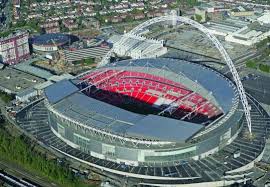By Andrew Warshaw
October 18 – Would it have been a national disgrace or was it vital for developing the country’s grass-roots game? The jury was out but now it makes no difference after the English Football Association’s proposed £600 million sale of Wembley stadium to Pakistani-American billionaire Shahid Khan unexpectedly fell through on Wednesday when the owner of Premier League Fulham and the Jacksonville Jaguars NFL team suddenly withdrew his offer.
Khan’s decision came just a week before the FA’s 127-member council was due to vote on the proposal, with reports suggesting that members were split, just like public opinion.
FA chairman Greg Clarke, his chief executive Martin Glenn and their fellow board members will be disappointed having pledged to use the money to upgrade amateur and non-league facilities. But many others believed the sale would have been a betrayal of England’s football heritage and the whole caboozle has now been called off.
Khan cited a lack of necessary support for the proposal within English football and said he did not want it to prove divisive, taking the decision to pull the plug when it became clear only a slim council majority could be achieved.
“The intent of my efforts was, and is, to do right by everyone in a manner that strengthens the English game and brings people together, not divides them,” said Khan in a statement.
“Unfortunately, given where we are today, I’ve concluded that the outcome of a vote next week would be far from sufficient in expressing the broad support favoured by the FA Chairman to sell Wembley Stadium. Until a time when it is evident there is an unmistakable directive from the FA to explore and close a sale, I am respectfully withdrawing my offer to purchase Wembley Stadium.”
Glenn said he fully respected the decision while confirming Wembley would not now be sold. “Mr Khan believed that his offer to buy Wembley Stadium would release funds to help improve community football facilities in England and that it would be well received by all football stakeholders,” said Glenn who must have been immensely frustrated.
In the end, perhaps tradition and emotion got the better of modern thinking. Critics made the point that it is only 11 years since Wembley re-opened its doors, minus the famous twin towers. If the sale had gone through, Wembley would have been a permanent home not to the national football team but to Khan’s Jacksonville Jaguars. In all likelihood it would at some stage have taken on a commercial partner and been forced to change its name. It still might.
We will never know now whether the revenue accrued would have been spent properly but supporters of the deal argued that those who criticised the FA for getting its priorities wrong were missing the point. In one fell swoop, they suggested, huge sums would have been freed up to improve facilities.
After all, it’s not as if Wembley would have been ripped up brick by brick. It would still have been the main home of English football – not least when it comes to the FA cup final – while fans elsewhere would have had a chance from time to time to see the national team in the flesh. Several other major footballing countries, notably Spain and France, operate the same way.
Instead, for the time being, Wembley will remain in its current guise. Thank Goodness for that, said critics of the proposed sale after Wednesday’s announcement. Is nothing sacrosanct?
A counter view is that the stadium is under-used anyway and a huge opportunity has been lost. Until and unless, that is, the mood changes and Khan – or someone else as rich – comes knocking again.
Perhaps in the meantime attention should turn as to whether the Premier League, whose 20 clubs are receiving an eye-watering £8.4bn from the current four-year tv deal, should be the ones to contribute more of their money than at present to grassroots improvements. It’s certainly a debate worth having says former FA chairman David Bernstein.
“There is not anywhere near enough money at the bottom end of our game – grassroots has been neglected,” Bernstein told the BBC. “We are completely out of balance in this country.
“The Premier League does pay some monies across to other parts of football but it is nowhere near enough. My view has consistently been that the Premier League should be levied, money should go to the FA, which would be distributed to the wider game and which would make the selling of Wembley unnecessary. A Premier League tax if you like. It is a major, major issue. It is something that should be explored and, if necessary, looked at by government.”
Contact the writer of this story at moc.l1713953914labto1713953914ofdlr1713953914owedi1713953914sni@w1713953914ahsra1713953914w.wer1713953914dna1713953914

